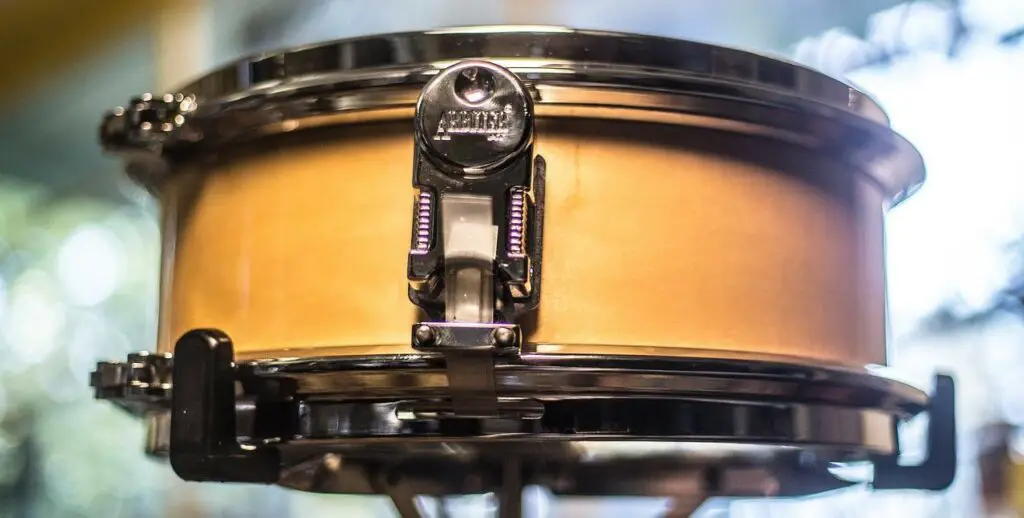Snare buzz is often referred to as a few different things, such as snare rattle, sympathetic buzz or sympathetic vibration. It refers to the buzzing/ rattling sound produced by the snare drum when a different drum is hit, such as the tom or bass drum.
A popular way to reduce snare buzz is by changing the pitch of the drums to ensure they are not the same or too similar to the snare drum. Alternatively, the other drums can be muffled, or the tension of the lugs around the snare wires can be reduced.
In this article I’ll take you through the most common causes and fixes for snare buzz. However, you should keep in mind that snare buzz is a natural part of an acoustic drum kit’s sound and the goal should be to control or reduce it, rather than try and eliminate it entirely.

Causes of Snare Buzz
It is common to hear a snare drum buzz or rattle when playing the other drums, most notably the toms, however it can also happen when hitting the bass drum. This is because the other drums are triggering the snare wires to buzz.
There are multiple reasons why the snare wires might be getting triggered, so it’s important to troubleshoot and go through the causes on this list to try and identify the reason and which drums are involved.
Common Causes of Snare Buzz:
- If the pitch of the tom and snare drum are similar, the snare wires may be triggered and rattle.
- If the tom has a lot of sustain, the snare buzz will be magnified.
- If the hardware is touching.
Cause #1 Similar Drum Pitches
The snare wires are easily triggered by drums with similar pitches to the snare drum. This occurs most commonly with unisons, octaves and perfect fifths.
- A unison is when two instruments have either the same pitch.
- An octave is when one instrument produces a frequency that is twice that of the other instrument (8 notes).
- A perfect fifth is when two instruments have a pitch with a frequency ratio of 3:2.
Cause #2 Excessive Sustain
If your toms or bass drum have a lot of sustain, this can really worsen the snare buzz. It comes hand in hand with cause #1, in that the pitch may cause some buzz, and the amount of sustain can therefore worsen it.
Cause #3 Hardware in Close Contact
The most obvious reason why you may be experiencing snare buzz is because the tom drum is touching the snare hoop or stand. This will cause really excessive snare buzz whenever the tom drum is hit, but luckily its incredibly easy to fix.

Preventing Snare Buzz
There are several ways to reduce snare buzz:
- Ensure the hardware is not touching
- Rotate the snare so the wires are far away from the tom
- Tune the drums to a different pitch
- Reduce the tension of the lugs around the snare wires
- Muffle the tom or bass drum
- Lower the tension of the tom’s pegs close to the snare
- Use a thicker snare resonant head
Work through this list in order to try and solve the problem.
Fix #1 Ensure the Hardware Is Not Touching
This is the most obvious thing to check, but still worth mentioning. Ensure that the tom drum/ stand is not touching the snare hoop or stand before you try any of the other fixes on this list. You might get lucky and find that this is why you’re experiencing excessive buzz.
Fix #2 Rotate the Snare so the Wires are Far Away from the Tom
This is unlikely to reduce the snare buzz dramatically, but it will help. Try rotating the snare drum so that the wires are positioned as far away from the tom as possible, this should help to prevent the tom from triggering the wires as much.
Fix #3 Change the Pitch of the Drum
In some cases it may be possible to dramatically reduce the snare buzz by altering the pitch of your tom or kick drum. Usually the tom is the most common issue, so I recommend starting by altering this first. Try tweaking it half a step and seeing if this helps the rattling.
You can also change the tuning of your snare drum, however many drummers would prefer to adjust their toms instead. Either way, you should may sure they aren’t tuned to the same pitch, or a perfect fifth/ octave if possible.
Fix #4 Reduce the Tension of the Lugs Around the Snare Wires
Turning the tuning pegs on the resonant head of the snare drum to reduce the tension slightly can really help to reduce the amount of snare buzz you’re experiencing. You may need to increase the tension on the other pegs to compensate.
Fix #5 Muffle the Drum
If you have found that adjusting the pitch of your tom or bass drum has reduced the snare buzz, but it is still more than you’d like, then you can try also reducing the sustain of whichever drum you adjusted.
Using these drum dampeners from Amazon on your tom is a good place to start and may fix the issue for a pretty low cost. Towels or pillows can be used to muffle the bass drum.
Instead, you can try lowering the pitch of the resonant head of your tom drum to reduce the sustain.
Keep in mind that this will change the sound of your drums quite dramatically, and cause them to sound more “punchy”.
Fix #6 Lower the Tension of the Tom’s Pegs Close to the Snare
Another option is to try and lower the tension of the tuning rods on your tom that are close to the snare drum. This helps to prevent the tom from triggering the snare drum as much. Start with the closest tuning peg on the batter head and lower the tension slightly to see if this fixes the issue.
Fix #7 Use a Thicker Resonant Head on Your Snare
This can help to make the snare drum less sensitive, however I’d only recommend trying this if you’ve exhausted every other option on this list and you’re comfortable with the fact that it’ll make your snare drum less responsive.
It is Almost Impossible to Eliminate Buzz
It’s important to be aware that it’s very unlikely that you’ll be able to completely get rid of snare buzz. It’s part of the natural sound of a drum kit and your goal should be to try and control it rather than completely eliminate it, as this will only lead to frustration!
Here are some more articles you might find useful:

